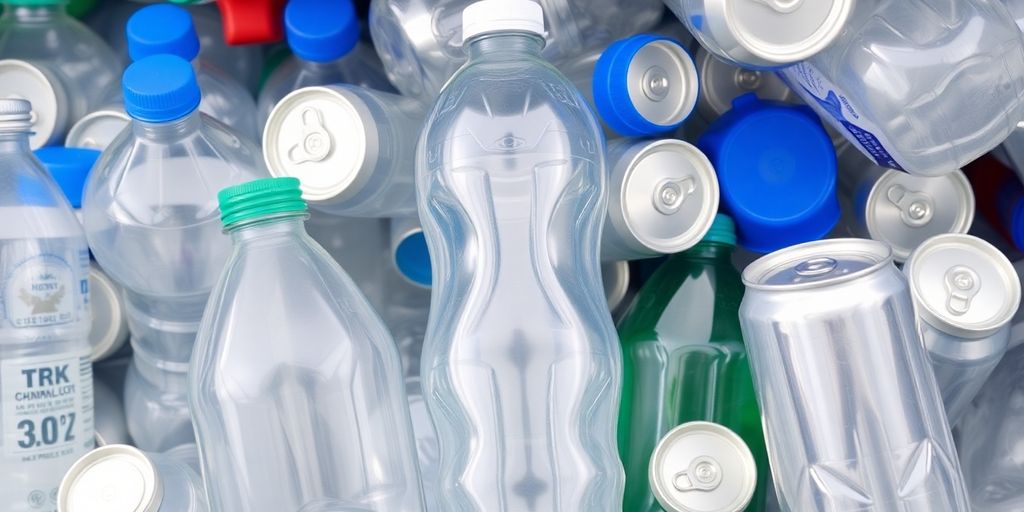
Deposit Return Scheme Launched for Drinks Containers in England and Northern Ireland
Share
The UK government has officially approved draft regulations for a Deposit Return Scheme (DRS) covering drinks containers in England and Northern Ireland. This significant environmental policy aims to tackle the persistent problem of litter and boost recycling rates across the nations, with a target launch date of October 2027.
Key Takeaways
- Scheme Scope: The DRS will encompass 150ml to three-litre single-use drinks containers made from plastic and metal.
- Environmental Impact: An estimated 6.5 billion single-use drinks bottles and cans are wasted annually, contributing to litter in streets, rivers, and oceans.
- Return Rates: The scheme aims to mirror the success of similar schemes in other countries, which boast return rates of up to 98%.
- Implementation Timeline: Regulations are now in force, with the appointment of a Deposit Management Organisation (DMO) expected in April 2025, and the scheme launching on 1 October 2027.
- Industry Reaction: While welcomed by some industry bodies for clarity and environmental benefits, concerns remain regarding implementation costs and timelines.
Tackling the Litter Crisis
Consumers in England, Northern Ireland, and Scotland collectively purchase an estimated 30 billion single-use drinks containers each year. A significant portion of these, approximately 6.5 billion bottles and cans annually, are not recycled and end up as litter. Research highlights the severity of the issue, with 97% of surveyed beaches found to be polluted with drinks-related items in 2023. Circular economy minister Mary Creagh stated that the UK has been "way behind" other nations with DRS, and that the public is "sick to death and fed up of seeing their streets and rivers blighted by litter."
A Step Towards a Circular Economy
The new legislation is designed to address long-standing concerns about packaging disposal, moving away from landfill and incineration. Minister Creagh emphasised the scheme's role in "cleaning up Britain" and ending the "throwaway society." The initiative is expected to transform waste into a resource, fostering "clean growth," economic stability, resilient supply chains, and new green jobs.
Northern Ireland's agriculture, environment and rural affairs minister, Andrew Muir, echoed this sentiment, highlighting the scheme's importance in achieving ambitious goals for climate protection, green growth, and waste reduction.
Scheme Administration and Launch
New legislation for England and Northern Ireland has now come into effect, paving the way for the appointment of the Deposit Management Organisation (DMO) in April 2025. This not-for-profit, industry-led body will be responsible for the scheme's administration and daily operations. Scotland is progressing with its own regulations, with the expectation of a unified three-nation scheme.
The regulations outline the scope of the DRS, the responsibilities of retailers, drinks producers, and suppliers, the DMO's functions, and the monitoring, compliance, and enforcement measures.
Industry Perspectives and Challenges
Major industry players like Coca-Cola Europacific Partners GB (CCEP GB) have expressed support for DRS, acknowledging its proven effectiveness in increasing recycling and reducing litter. They welcome the clarity provided by the new regulations and the prospect of an aligned scheme with Scotland, despite acknowledging the challenges in meeting the timelines.
The Association of Convenience Stores also welcomed the certainty, enabling local shops to prepare for the 2027 launch and for communities to benefit from reduced litter and higher-quality recycled materials. However, retailers have also voiced concerns, with the British Retail Consortium (BRC) warning of significant costs for businesses. The BRC urged the government to reconsider the 2027 timeline, calling the DRS a "massive undertaking" that must be implemented correctly to justify its substantial costs, estimated to reach £2 billion. They also highlighted the risk of fraud in a fragmented system, where containers from regions without a deposit could be redeemed elsewhere.
